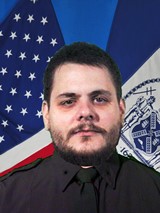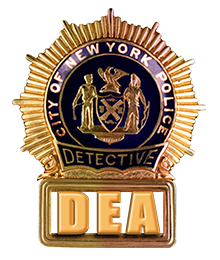The DEA Honor Roll
Official Line of Duty Deaths
James Zadroga

Rank: Detective
Shield Number: 6663
Command: Manhattan South Homicide
Date of Death: 01/05/2006
Cause of Death: Illnesses contracted as a result of work on the rescue and recovery from the World Trade Center attacks of September 11, 2001.
Det. James Zadroga passed away on January 5, 2006 as a result of various respiratory and digestive diseases and disorders developed from his exposure to the remains of the World Trade Center. Zadroga was the first member of the NYPD whose post-9/11 death was directly linked by a medical examiner to the rescue, recovery, and clean-up efforts of the terrorist attacks, and the political bills named in his honor memorialize his family and his union’s fight to honor all of the thousands of public servants who succumbed to disease and death because of their work in the highly toxic rubble.
Zadroga grew up in North Arlington, New Jersey where his father was a police chief. He attended Bergen Community College and was appointed to the NYPD January 13, 1992. His first assignment was the 6th Precinct in Manhattan. In early 1997, he transferred to the Street Crime Unit in Queens, where he was promoted to Detective on June 4, 1999.
Like thousands of other members of the service, Zadroga was reassigned to 9/11 rescue, recovery and clean up efforts and logged approximately 500 hours of duty in the World Trade Center rubble. He began having breathing difficulties when he returned to his new command, the 25 Squad, in late December of 2001. He transferred to Manhattan South Homicide in June of 2002, but his medical condition worsened. He retired on a disability November 1, 2004.
James’ ailments had already taken an irreversible toll on his wife Ronda, who died the same year from medical issues exacerbated by the family’s stress.
As his illnesses progressed, Zadroga was required to use a wheelchair and remain on oxygen around the clock. He moved in with his parents in New Jersey so they could assist with his then-four-year-old daughter, Tyler Ann, who survives him, as does his parents Linda and Joseph. At the time of his death, James Zadroga was 34 years old.
As a result of Zadroga’s death, the DEA and other New York City and State public sector unions representing first responders fought hard for legislation that would protect the health and welfare of those police, firefighters, and others who worked at the WTC and related sites, such as Ground Zero, the Staten Island Landfill, and the Morgue. New York State legislation was drafted and passed to allow for the possibility that after retirement, if a worker became ill or disabled because of their WTC service, their pension could be re-examined and recalculated for a disability pension. Likewise, if that disability led to a post-retirement death, the death might be construed as a line of duty death. The law was previously not equipped to recognize illnesses or deaths as line-of-duty after retirement from City service.
The World Trade Center Disability bill and the World Trade Center Death Benefit bill (also known as the Zadroga bills) were signed into law by Gov. George Pataki in 2005 and 2006 respectively, with amendments to the Zadroga bill being finalized and signed into law by Gov. Eliot Spitzer on March 14, 2007.
This granted Det. Zadroga’s family full death benefits and finalized Det. James Zadroga’s case as an official NYPD line of duty death.
As the years passed, it became evident that federal assistance was also needed to assist the health and welfare of the WTC first responders and for those who lived and worked in lower Manhattan, where toxic pollutants had fouled the environment after the 9/11 attacks. Legislation was drafted and although officially called the 9/11 Health and Compensation Act, it was also nicknamed “the Zadroga bill.”
After intense lobbying by the entire New York Congressional delegation, labor unions, police and fire brass, desperately ill workers, and the families of those who had succumbed to illnesses and diseases, on the afternoon of December 22, 2010, an amended version of the 9/11 Health and Compensation Act passed the United States Senate. The amended version of the bill reduced its proposed funding from $7.4 billion to $4.3 billion, and carried some other restrictions. This amended bill went back to the U.S. House of Representatives, where it was quickly approved with a vote of 206 to 60. Despite debate and partisan politics that surrounded this undertaking, Republicans and Democrats ultimately came together and President Obama signed the bill into law as he promised he would on January 2, 2011.
This bill provided approximately $1.8 billion for health monitoring and treatment of first responders, along with an additional $2.5 billion to resurrect the WTC Compensation Fund for a total package of $4.3 billion dollars. Guidelines for claims and compensation were established with government offices designed specifically to oversee the efforts of this unique and important to response to the unprecedented domestic medical disaster 9/11 had created.
As the bill crept towards its partial expiration, another hard push was made for its renewal by labor unions, New York City and State politicians, police and fire leaders, and the Zadroga family who joined dozens of suffering police and firefighters and other workers who were suffering from environmentally induced cancers. They argued that if the federal “Zadroga bill” was not renewed, then screening, diagnosis and treatment of 9/11-related illness would not be equitable: while the responders who were diagnosed earliest would be covered under the original bill, those who were in the pipeline would not be getting their due as they later fell sick and/or died.
After hearty lobbying efforts for the bill’s renewal, on Friday, December 18, 2015, President Barack Obama signed into law an omnibus spending bill that was agreed upon by members of the House of Representatives late Tuesday, December 15th and previously passed by the Senate. The bill included the renewal of the federal “Zadroga” Act (the 9/11 Health and Compensation Act). Under its terms, medical monitoring and health care for first responders was funded through 2090 – for 75 years. The second part of the Act, the Victim Compensation Fund, provides financial assistance to the families of first responders and was fully funded through 2021 (five years) at an allotment of $4.6 billion.
In July 2019, the “Never Forget the Heroes: James Zadroga, Ray Pfeifer, and Luis Alvarez Permanent Authorization of the September 11th Victim Compensation Fund Act” was signed and put into effect. This bill funds through Fiscal Year 2092 the September 11th Victim Compensation Fund of 2001. Additionally, the bill modifies the Victim Compensation Fund (VCF) to allow claims to be filed until October 2090, to require VCF policies and procedures to be reassessed at least once every five years (currently, at least once annually), to require claimants to be paid for the amount by which a claim was reduced on the basis of insufficient funding, to remove the cap on noneconomic damages in certain circumstances, and periodically to adjust the annual limit on economic loss compensation for inflation.
